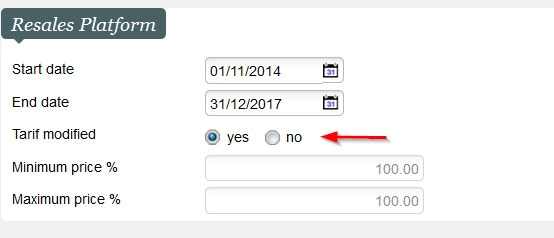...
- Season ticket holders who can't make a performance or match place their ticket on the exchange market. They cannot select the ticket price.
- When the ticket resells, resellers receive the actual amount they paid. For example, a season ticket holder buys a ticket at €400 un abonnement pour un championnat comptant €400 subscription for a championship with 10 matches. Chaque match lui coûte donc 40€. Il recevra donc 40€ pour la revente de son billet.
- Le nouvel acheteur paie et reçoit un billet au tarif occasionnel de 45€.
- Vous percevez un revenu additionnel de 5€ correspondant à la différence de prix entre un billet abonné et un billet au tarif occasionnel.
Comment activer ce nouveau mode de fonctionnement de la bourse d'échange ?
- Cocher le paramètre adéquat dans l'écran Filières de vente > Point de vente > Paramètres internet:
- Pour chaque événement ou compétition susceptible d'être acheté au sein d'un abonnement, sélectionner le tarif occasionnel auquel un billet abonné doit être revendu dans l'écran Catalogue > Evénement/Cométition > Paramètres:
Remarques importantes:
- Le changement de tarif ne concerne pas les billets occasionnels remis sur la bourse d'échange. Par exemple, si un contact remet en vente un billet au tarif occasionnel enfant (ce billet n'appartenant pas à un abonnement), il sera disponible, sur la bourse d'échange, à ce même tarif, même si le tarif configuré pour la revente de billets abonné est "occasionnel adulte".
- Lorsque ce deuxième mode de fonctionnement est activé, un revendeur de billets occasionnels ne pourra pas non plus choisir le prix de revente de son billet. Le but est d'éviter une distorsion de concurrence entre les revendeurs de billets abonné et de billets occasionnels.
- Il est important de décider une fois pour toute quel paradigme adopter, de préférence dès la création de la bourse d'échange. En effet, le changement de paradigme modifie les conditions de revente des billets et il faut éviter de modifier ces conditions alors que des billets ont déjà été remis en vente sur la bourse d'échange. Si cela n'est pas possible (en particulier si une bourse d'échange est déjà en service avant Piz Bernina V2), il faut attendre que tous les billets disponibles sur la bourse d'échange soient revendus, voire les supprimer de la bourse d'échange.
- Pensez également à stipuler clairement cela dans les conditions générales de ventes de votre bourse d'échange.
...
- Therefore each match costs him €40. Consequently he will receive €40 for the resale of his ticket.
- The new purchaser pays for and receives a ticket at the casual tariff of €45.
- You make an additional €5, which is the difference between the season ticket and casual ticket price.
How do I activate this new operating method in the exchange market?
- Select the relevant parameter in Sales Channel > Point of Sale > Internet parameters
- For each event or competition likely to be purchased as part of a season ticket, select the casual tariff for season ticket resale in Catalogue > Event/Competition > Parameters:
Important:
- Changing the tariff doesn't affect casual tickets placed on the exchange market. For example, if a contact puts a casual child ticket up for resale (which doesn't belong to a season ticket), it will be available on the exchange market at the same price even if the tariff configured for reselling subscription tickets is 'adult casual ###".
- When you activate this alternative operating mode, customers reselling casual tickets will no longer be able to choose the resale price for their ticket either. The aim of this is to prevent unfair competition between those reselling season tickets and those reselling casual tickets.
- It's important to decide once and for all which method you wish to use, preferably as soon as you create the exchange market. Changing the model modifies the ticket resale conditions, so you need to avoid changing these conditions once tickets have been placed on the exchange market. If this isn't feasible (especially if an exchange market is already up and running before Piz Bernina V2), you will need to wait until all the tickets available on the exchange have been resold, or delete them from the market.
- Lastly, remember to clearly stipulate this in your general conditions of sale for the exchange market.
Adapting the exchange market for large volumes of tickets
Afin de faciliter la revente d'un grand nombre de billets, la bourse d'échange propose désormais un processus de vente basé sur le plan de salle. Ce processus supporte à la fois les ventes en zones numérotées et non numérotées. La sélection de places en zones numérotées est illustrée ci-dessous.
...

